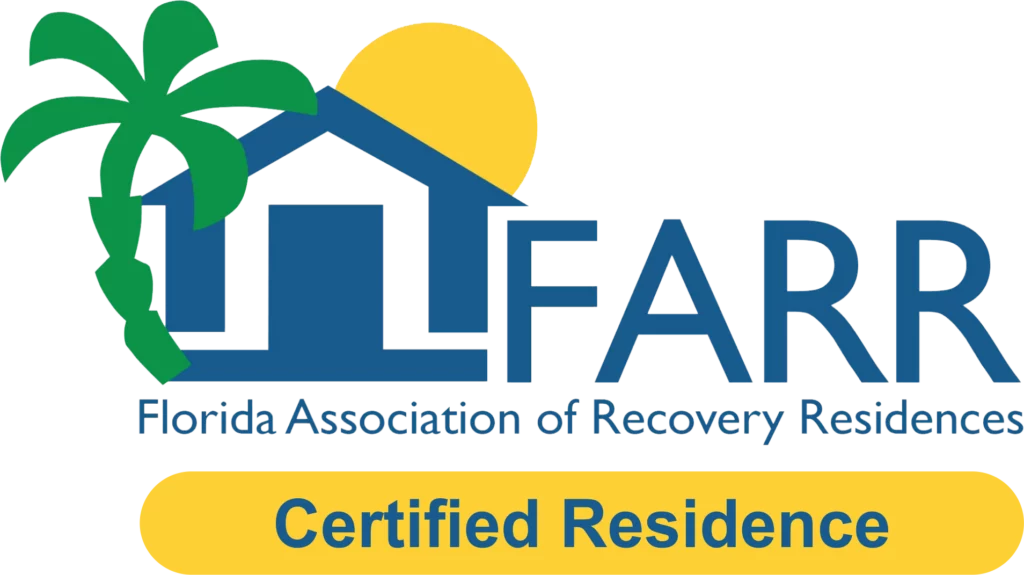Recovery Residence
Ready to Take the Next Step?
We are Ready to Help, Call Now!
Turning Point of Tampa has helped thousands find recovery. As an in-network facility, we are able and committed to helping you find the life you deserve.
Recovery Residence for Men
For many men grappling with addiction, the road to recovery stretches beyond the rigors of an inpatient facility program. Turning Point of Tampa offers a structured Level IV recovery residence for those wanting to set down through the continuum of their substance abuse treatment.
Tailored to champion sobriety, Turning Point of Tampa immerses residents in an environment where every day is crafted to support and nurture their journey to maintain a sober lifestyle.
With accreditation from the Florida Association of Recovery Residence at a prestigious Level IV, a stay at Turning Point of Tampa is synonymous with quality, compliance, and care.
Key Takeaways
Turning Point of Tampa’s Recovery Residence for Men Offers a Stable Environment Conducive to Maintaining Sobriety
Partial Hospitalization and Intensive Outpatient Programs Complement the Residents’ Journey by Integrating Care With Daily Obligations
Rigorous Staff Assistance Ensures Residents Receive Comprehensive Guidance Towards Sustained Recovery
Transitioning From Treatment Involves Learning Life Skills and Preparing for Independent Sober Living Through Stepped Care Levels


Living in a Sober Environment
Nurturing a life of recovery necessitates more than abstinence; it demands a radical alteration of one’s perspective and daily routine. At Turning Point of Tampa, the Recovery Residence for Men facilitates a stabilizing atmosphere where occupants not only pledge to stay sober but also engage actively in their chosen outpatient services to address their substance use disorders .
The warm home setting provides a platform for attending outpatient levels of care as a a first step on the path to recovery or as a step down from a higher level of care. Each resident steps into a daily rhythm that intertwines the rigor of structure with the support imperative for early recovery.
Attending Outpatient Services (PHP/IOP)
Marked by the transformation of daily routines—among them, the structured pathway offered through a outpatient programming. The men participating with Turning Point of Tampa are committed to this therapeutic process that reinforces the tools and strategies learned during higher levels of care such as detoxification, inpatient, and residential care.
Active participation in treatment enables individuals to fortify their foundation in developing long term recovery while navigating the complexities of their personal and professional lives. It is in this unique crossroads of care and independence that the men at Turning Point of Tampa Recovery Residences begin to manifest resilience and self-reliance.
Accountability for Success
Accountability remains the cornerstone of sustained recovery in the Recovery Residence for Men. The men at Turning Point of Tampa understand that transparent communication and commitment to the group’s rules and values are imperative to maintain a lifestyle free from substance abuse.
A semblance of structure is instilled through regular check-ins and community gatherings, which serve as vital touch points throughout the day to share their progress and address any challenges. These practices ensure that each individual’s journey is not a solitary endeavor but a collective pursuit with communal reinforcement.
Florida Association of Recovery Residence - Level IV
The designation of a Florida Association of Recovery Residence (FARR) – Level IV as awarded to Turning Point of Tampa’s Recovery Residence for Men is a testament to its commitment to quality and its adherence to the highest standards in the realm of recovery housing, voluntary certification program, and becoming recovery residence administrators.
The Florida Certification Board has initiated a credential for Recovery Residence Administrators. Anyone can search the Florida Certification Board credentials database to determine if a specific Recovery Residence Administrator is certified or is in the process of becoming certified. Turning Point of Tampa has completed all requirements to achieve level IV.

Administrative Responsibilities
The team at Turning Point of Tampa consistently upholds the FARR Level IV standards through diligent oversight of Recovery Residence operations. The certified recovery residence administrator has a pivotal role that spans from maintaining compliance with regulatory entities to implementing Florida statutes and policies that exceed the national standards.
Dedicated personnel diligently manage the logistics of the residence, from resident intake to coordinating aftercare, ensuring a seamless continuity of service. Their exemplary administrative acumen creates a robust foundation that allow the Turning Point of Tampa Recovery Residences for Men to operate at its optimum.
Services Offered
Turning Point of Tampa’s Recovery Residence proudly extends a comprehensive suite of services tailored to the unique path of each resident. These offerings include personalized counseling, skill-building workshops, and relapse prevention and education, all structured to reinforce an individual’s commitment to their new lifestyle.
Recovery Residence - Men Only
The Recovery Residence for Men, an integral part of Turning Point of Tampa, represents a safe harbor exclusively for men embarking on their new journey. This gender-specific household creates a brotherhood of understanding and shared experiences, significantly contributing to facing addiction.
Catered specifically to male patterns of addiction and recovery, the residence nurtures a culture where men feel comfortable expressing emotions and challenges that are often perceived as stigmas in wider society.
Staff Requirement
At Turning Point of Tampa, the importance of having qualified staff to guide the men through their process cannot be overstated. The Recovery Residence for Men relies on a team of professionals whose expertise is delivering an impactful and tailored plan to meet the needs of each individual.
Staff members are meticulously chosen based on their ability to provide compassionate care and uphold the stringent standards of the recovery residence administrators. Their roles and responsibilities are vast and varied.
Residence will be under twenty four hour/ seven day per week monitoring of trained staff. This provides for safe structure and support at all hours of the day and night. Clinical staff will be available at all times for residents in need.
Learning to Live Sober

The transition to a sober lifestyle at Turning Point of Tampa Recovery Residence for Men involves more than abstaining from drinking alcohol or using one’s drug of choice; it requires the integration of essential skills that uphold sustained abstinence.
Men at the residence are guided through various phases of care that gradually reduce the intensity of support as they rebuild independence.
In anticipation of transitioning out of treatment, preparing individuals to re-enter society with confidence is an important goal of this transformative process.
Residence will attend daily 12 step support groups accompanied and transported by staff. This will allow for ongoing strengthening of recovery support networks and establishing/strengthening a relationship with a sponsor.
Stepping Down Through Care
As residents progress in their recovery, Turning Point of Tampa facilitates a graduated reduction in support, enabling individuals to acclimate to increasing levels of personal responsibility. This methodical drawdown, known as ‘Stepping Down Through Care,’ is an essential phase where men harness their newly acquired sobriety skills to maintain their recovery with less direct supervision.
Transitioning through different levels of care allows each resident to test the resilience of their sobriety in real-world scenarios. Turning Point of Tampa’s approach ensures that by the time residents are ready to leave, they are equipped with the confidence and self-sufficiency required to thrive outside the supportive confines of the sober living environment.
Preparing for Leaving Treatment
Embarking on the next chapter, residents at Turning Point of Tampa’s Recovery Residence for Men meticulously prepare for their departure from treatment. They refine coping strategies and solidify support systems that will sustain their sobriety in the broader community.
As residency nears its completion, these individuals create detailed aftercare plans that map out their continuing journey toward recovery:
- Identifying local AA meetings to maintain a robust support network,
- Planning for transition into appropriate longer term sober living arrangements if needed, and
- Establishing connections with outpatient resources to perpetuate growth and prevent relapse.
Turning Point Tampa: A Reflective Summary
By providing a structured, sober living environment tailored specifically for men, the residence enhances the recovery experience through intensive outpatient programs, employment support, and accountability.
The FARR Level IV designation underscores the residence’s commitment to quality and adherence to the highest standards of recovery housing.
With a combination of life skills training, gradual reduction in support through stepped care, and thorough preparation for re-entry into society, Turning Point of Tampa equips residents with the necessary tools and support networks to navigate life soberly and successfully.
Consequently, the residence stands out as an integral component of the recovery journey for many men committed to rebuilding their lives free from substance dependence.
Frequently Asked Questions
The Florida Association of Recovery Residences, often referred to as FARR, represents the gold standard in support for those in recovery from addiction. Established with a commitment to ensure quality services and support within sober living environments, FARR holds its affiliated residences to stringent ethical standards. At its core, FARR operates on the belief that all individuals have the right to recover in a safe, comfortable, and dignified environment. The organization functions as an accrediting body, certifying sober living residences that adhere to its strict code of ethics and operational procedures. Concerns regarding care standards or grievances can be directed to FARR online at https://farronline.info/grievance or by phone at 561-299-0405. The FARR Code of Ethics that recovery residences and their staff adhere to can be viewed at https://www.farronline.org/ethics.
Recovery residences, also known as sober living homes, offer a vital bridge between an intensive outpatient program and full reintegration into society for individuals striving for sobriety. These facilities provide structured environments where residents can fortify their sober lifestyle, supported by peers and staff knowledgeable in the complexities of addiction recovery. The National Alliance for Recovery Residences (NARR) categorizes sober living homes into four levels based on the intensity of support, structure, and services provided; each is distinctly equipped to cater to different stages in an individual’s recovery journey.
Level 4 recovery residences distinguish themselves from other levels by offering the highest degree of structure and support. These facilities typically feature a robust clinical setting, often staffed with professionals including psychiatrists, psychologists, and licensed counselors. Unlike Level 1 homes, which provide minimal structure and may not have paid staff, or Level 2 homes, which offer a moderate level of support with at least one live-in manager, Level 4 settings resemble therapeutic communities. They are more reminiscent of residential treatment centers than the peer-run sober environments of Level 3 homes.
Navigating the path to sobriety, individuals encounter various terms that reference the supportive environments available to those in recovery from addiction. Recovery residences and recovery houses often emerge in conversations, each playing a distinct but pivotal role in the journey towards lasting sobriety. Despite the similarities in their objectives to provide secure and substance-free living spaces, distinguishing features set these two apart.
A recovery residence is typically a broader term that encompasses a multitude of structured living environments for individuals recovering from substance abuse. These residences provide a stable, supportive community where members partake in regular meetings, activities designed to promote sobriety, and in some c ases, access to professional onsite staff. Key to a recovery residence’s environment is the balance of supervision and independence; it offers a scaffolded approach to rebuilding one’s life. The goal of such a residence stretches beyond mere abstinence, as it seeks to foster personal growth, accountability, and the development of life skills required for sober living.
In contrast, a recovery house, often referred to as a “sober house,” usually signifies a more self-governing living arrangement. While it still provides an alcohol and drug-free environment, residents may experience fewer restrictions and less formal structure. Recovery houses are typically run by peers, who themselves are in recovery, instilling a sense of shared responsibility and mutual support among the house members. The lack of formal clinical services distinguishes these houses from recovery residences that might offer intensive outpatient programs or be affiliated with organizations such as AA. However, residents are often encouraged to participate in external support groups and recovery programs as part of their ongoing sobriety commitment.

